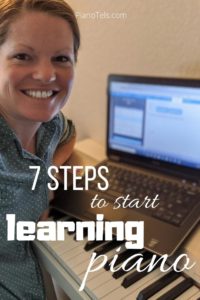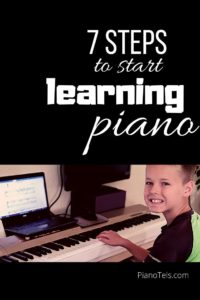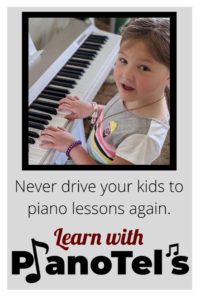There’s never been a better time to start learning the piano than right now! But it’s easier said than done, right? Where exactly do you start learning piano? There’s so much to take in, just where do you begin?
Let’s break it down step by step, and you will begin playing piano in no time!

1. Get a piano.
The first step to get you on your way to learning piano is to make sure you have a keyboard or a piano to use. While there are some online pianos available for use, they won’t get you very far in learning piano. If you aren’t willing to buy or do what it takes to get a piano in your home, then it shows a lack of commitment which won’t get you very far in learning piano!
There are so many options available for you in getting a piano, so if money is an issue, then don’t let it be. You will be able to find many free, or very inexpensive pianos that you can find online. You do need to be aware that a lot of free pianos aren’t worth buying (see my article on Is a Free Piano Worth It?). But you may be surprised at how many free pianos are out there that definitely still have some life in them.
You need to consider whether or not you want a keyboard or an acoustic piano. Consider how much space you have, whether you need it to be able to be portable, if you would like volume control, or what programs you would like to use with it. An acoustic piano requires more maintenance (yearly tuning), but often is preferable to sound quality vs a keyboard. For full considerations on whether or not to choose a keyboard or an acoustic piano, visit my article on Keyboards vs Pianos: 14 important considerations.
2. Choose your learning method.
This is probably the single most important step in learning piano! Please take special consideration as to how you are going to learn piano. You will want to research this thoroughly and evaluate your own interest level, needs, and goals in piano.
You can learn piano by yourself.
YouTubes: There are plenty of YouTube videos out there that will teach you how to play piano. You can simply search for them, find the piano player you like best and follow what they do! I would just warn you that this method is very difficult to keep a clear line of what to do when. You may find yourself a little lost on where to go next. You may also find that your piano learning is not as complete as you may like. But this method can and does work for some people.
Hoffman Academy on YouTube is one of those YouTube free online courses you could check out. This is specifically made for kids, but sometimes that can work great for adults too.
Online Programs: There are dozens upon dozens of online piano lessons. How do you choose which one to go with? I would suggest you evaluate what exactly you are wanting out of your piano lessons. I am confident you could find the right program for you. Here’s several that I have used that could get you started:
- If you would like to learn piano quickly through learning chords, you like popular songs, and want to get playing as fast as possible with very little investment, I would suggest Pianoforall. It is an all inclusive one-time fee of $39.
- If you would like to get a pretty thorough education and not cut corners, would like to pick and choose from a massive music library, would like a balanced more thorough learning of piano, and improve your sight reading like no other program could, then check out Piano Marvel. They have a pretty remarkable 30 day trial (better than any other free trial out there that I could find, and I have tried quite a few). If you like the trial version, this program runs for $12.99 with my promo code pianotelspromo.
- If you enjoy a very pleasing interface, great tutorials by celebrities, and a lot of coaching through actual video, then Playground Sessions may be your fit. It runs for $17.99/month.
- Piano with Willie is for those that are wanting to learn jazz piano. And he knows how to do it right! These are some pretty stellar video lessons and I couldn’t help but love this program. There aren’t any interactive tools and no song library, but these are high quality content tutorials. He often puts on some fun live lessons that you can join in. The cost is $29.97/month.
I have a full article breaking these online lessons down with a few more particulars that you could visit at Top 6 Online Piano Lessons and What Each Does Best.
Please note that if you choose an online program, it would be best to have a digital keyboard to go with it. While some programs don’t need a digital piano to work, they still would be best utilized with a keyboard.
You can learn piano with a teacher.
Probably one of the best things about getting a piano teacher is that you have an accountability coach. That teacher will be there week after week, and you will be accountable for your practice and progress when you visit with them every week. This is likely the #1 reason traditional piano teachers are still very much needed.
When choosing a piano teacher, don’t be afraid to find one that fits you, your goals, and your personality. What to Look For When Choosing a Piano Teacher is a great article to get you started.
You can use online piano lessons WITH a teacher.
There are some online piano programs that have a hybrid of online lessons/interactive tools and real, live teachers, too:
- ArtistWorks with Christie Peery is one of those unique programs that has online lessons combined with your own personal teacher. You submit video footage and receive your own personal feedback but also have the benefit of working with the online program.
- Piano Marvel also has certified teachers that use their program while still teaching traditional lessons.
There are plenty of options for your learning method, so pick one that works well for you! This is one of them most exciting steps to take! When you do, you will be well on your way to learning piano.
3. Use correct positioning and fingering.
When you begin playing on the piano, it is important to prevent injury. Many untrained pianists find themselves playing piano in a way that could be detrimental to their back or shoulders. So make sure that you have proper posture. Imagine a 90 degree angle from your back to your legs when sitting, a 90 degree angle at your knees with your feet rested on the floor. Your elbows should also have a 90 degree angle.
Your wrists do not rest on the piano, but are held up as if a bubble was suspending them right above the keyboard. Sit far enough from the keyboard that your fists just reach the back of the keyboard if you are sitting straight up.
Follow the fingering on your sheet music. You will learn about your fingering in the method that you have chosen. You will want to learn the correct fingering because you will want to build muscle memory in your fingers as you practice. It makes it much easier for you in the long run.
4. Practice what you learn.
This becomes the make or break it step of learning the piano! Practice becomes your best friend to mastering this skill.
You must practice in order to progress. Practice will serve you best if you sit down at the piano every day. Ten minutes every day for a week will be way better than practicing 70 minutes in one day. Pace yourself and practice, practice, practice. Don’t give up on yourself for we all have to learn and the more you do it, the easier it will become.
Create a practice plan and stick to it every day. Find the time you will practice and the amount you are going to put into it and stick with the plan. There is some semblance of skill involved in piano, but more than anything it is the amount of effort you decide to put into it. There will be a direct correlation with practice and skill.
When practicing, try and play it as close to perfection the first time you play it. The first time you play your music, the brain logs it away in a unique place that takes precedence over the other times that you play it. For that reason, you want to make sure that you play a passage as correctly as possible the first time you play it.
Start slow. Speed does not make the best piano players, but accuracy does. So it’s fine crawling along the first time you play it. Just make sure you play it as correctly as possible from the very first time you play it.
Try to watch the music, not your hands. The more you can look at the music and not the hands, the easier it will be for you in the long run. It’s hard at first and our natural reaction is to watch where your fingers go, but your lessons will gain muscle memory quickly and that’s the goal.
5. Work on all areas of piano including method, technique, music theory, sight reading, and ear training.
Ideally, you want to have a balanced piano education, and that includes more than just learning song by song!
Learning method refers to learning how the piano is played and the patterns of music.
Your technique refers to speed and mobility in your hands. The more you practice your technique, the better you will play as it will help you to play it well.
Music theory includes knowing what the symbols mean, what you are looking at when you read your sheet music.
Sight reading becomes one of the most fun things to work on. The better you can sight read, the more you can just sit down and play the piano without having to “work through” it as much.
Ear training helps you in many ways. It helps you to self-correct. It helps you identify patterns that you can then use in a variety of ways as you play and as you begin to compose.
6. Perform your music.
The more you perform, the better you get at it and the more comfortable you will get at it as well. Performing helps you to perfect your pieces in a way that no other method will. It gives you a deadline and you need to perfect it before that time, so it makes you practice that much more.
You can perform so easily now with recording and posting on social media or YouTube. Take advantage of that! You can also perform live for family and friends. Play at a nursing home or a retirement center. Volunteer to accompany your local church or school choir.
7. Continue to progress.
The best way to get better is to make measurable goals and continue to progress. Continue to move yourself to the next level. Continue practicing and performing.
For years, I played piano with one major flaw that kept me from progressing. I would play the same songs over and over again. I wouldn’t learn anything new. I would just sit down and play my same old songs.
And guess what? I never got any better. No surprises there, right?
It wasn’t until I started picking up new songs, started experimenting around with some different online programs, started teaching more students that pushed me to progress as well, and started networking with other teachers that I really started to progress.
Find ways to challenge yourself. Your online piano lessons and/or your teacher will help you do so! But make sure that you are taking your piano learning into your own hands and progressing at the pace that would challenge you.
How long will it take to learn the piano?
This is a valid question and one that you have complete control over. Learning how to play the piano is like learning another language. The more you immerse yourself, the quicker you will pick up on it. Learn a word here or there and it will take your whole life to get a grip on the language. But with a little bit of commitment, you will advance quickly and master it.
I would suggest dedicating 30-60 minutes of practice and learning per day to begin with. Keep that pattern as consistent as possible, but do allow yourself a break and take off a day or two. Make a practice plan and stick with it. Just make practicing a habit, just like brushing your teeth. A good regime would be 30-60 minutes a day on Monday, Tuesday, Thursday, Friday, and Saturday. You have a couple days off so you don’t get burned out, but the consistency of those days of practice will really pay off.
Of course, every person learns at different speeds, but I could safely say that if a person is putting in 30-60 minutes a day, a student will move from beginner to intermediate well within a year. Give yourself a couple years of dedicated practice and you can seriously progress and move to more advanced material.
If you don’t have the time or the desire to put in as much effort into daily practice, then by all a means, take it at your own pace! It may take longer to progress, but don’t give up on it and keep at it, albeit slow and steady. Just don’t quit, or take long breaks, because you will forget fast.
Related Articles:
How Much Time Do Pianists Practice Every Day?
Free Online Music Note Flashcards Game
Best Online Piano Lessons for Free

Tel loves her life as a piano player, a piano teacher, and a mom. Amid piano blogging, piano teaching, and piano playing, she loves a chance to fit in a good exercise class, volunteer at her kids’ school and at her church, and go on long dates with her husband. Full bio at About Tel.



Hi, do you know anything about the Casio ctk-574? Just wanting to buy a used one. Thanks!
It’s not a bad model, you would just want to make sure you have a high quality midi interface cable to use with it if you are going to be utilizing that! It looks like it may lack touch response keys, but it will get you by for a beginner.
A good and detailed post on piano learning. Thank you for this. Can you also give some tips about adults who are looking to learn piano? Any suggestions?
Yes! I would suggest starting with a good piano software, such as Piano Marvel. Set your goals of piano practice, and get to it! Having a teacher is also very helpful as it will keep you accountable and they can teach you things software just simply can’t. Good luck on your journey!